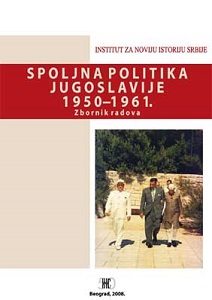U senci gvozdene zavese.
In the Iron Curtain Shadow.
The Yugoslav UNICEF Experience
Author(s): Sanja Petrović Todosijević
Subject(s): Diplomatic history, Political history, WW II and following years (1940 - 1949), Post-War period (1950 - 1989), History of Communism, Cold-War History
Published by: Institut za noviju istoriju Srbije
Keywords: Yugoslavia; UNICEF; USA
Summary/Abstract: The policy of the Yugoslav state toward the International Children’s Fund in the period following the end of World War II reflects the international position of the socialist Yugoslavia which was considered, until the summer of 1948, a territory under pronounced Soviet sphere of influence. In keeping with the policy of Western powers and the United States, after the conflict with the „big” Soviet leader it acquired a status of a country which should at least be „kept afloat”. By the summer of 1950 Yugoslavia became a privileged benefi ciary of UNICEF programmes. As the only Eastern bloc country which managed to oppose Soviet infl uence and tried to build what was often referred to as „its own road to socialism”, Yugoslavia became strategically an extremely important partner to Western democracies. The work of the UNICEF Mission’s Office in Belgrade, particularly the activities of its foreign members, were under close scrutiny of the community traditionally sceptical of anything and anyone coming from abroad or more precisely from the West. They were also closely watched by police bodies of the new Yugoslav authorities which did not want to take any chances. The need to protect and defend the established order, particularly after the split with the USSR in the summer of 1948, often turned into paranoia. Field work was an additional challenge for the Yugoslav police. Restricted in movement, access to information and institutions through which UNICEF programmes have been carried out, the officials of the Fund Mission temporarily on assignment in Yugoslavia have been facing challenges of development of the new state and order in socialism. Promotion of UNICEF activities in FPRY was in direct correlation with Yugoslavia’s foreign-policy orientation between 1947 and 1954.
Book: Spoljna politika Jugoslavije 1950-1961.
- Page Range: 416-436
- Page Count: 21
- Publication Year: 2008
- Language: Serbian
- Content File-PDF

